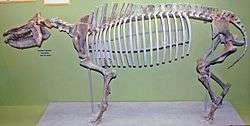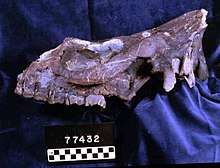Diceratherium
Diceratherium is an extinct genus of rhinoceros endemic to North America, Europe, and Asia during the Oligocene through Miocene living from 33.9—11.6 mya, existing for approximately 22.3 million years.[2] Mass estimates for the type species, D. armatum average around 1 t (2,200 lb)[3]
| Diceratherium | |
|---|---|
 | |
| Skeleton, University of Wyoming Geological Museum | |
Fossil | |
| Scientific classification | |
| Kingdom: | |
| Phylum: | |
| Class: | |
| Order: | |
| Family: | |
| Genus: | Diceratherium Marsh, 1875 |
| Type species | |
| † Diceratherium armatum Marsh, 1875 | |
| Species[1] | |
| |
Taxonomy

Restoration of D. tridactylum

Skull, University of California Museum of Paleontology
Diceratherium was named by Marsh (1875). It is not extant. Its type is Diceratherium armatum. It was assigned to Rhinocerotidae by Marsh (1875) and Carroll (1988); to Diceratheriinae by Prothero (1998); to Aceratheriinae by Weidmann and Ginsburg (1999); and to Teleoceratini by Sach and Heizmann (2001).[4][5] Diceratherium had two horns side-by-side on its nose. It lived during the Miocene Epoch.
gollark: Have you tried switching to fossil?
gollark: So is `m`.
gollark: We have some software optimizing bee distribution.
gollark: It's very ethical.
gollark: BEE eugenics.
References
- Prothero, Donald R. (2005). The Evolution of North American Rhinoceroses. Cambridge University Press. p. 228. ISBN 9780521832403.
- PaleoBiology Database: Diceratherium, basic info
- Paleobiology Database. "Diceratherium, morphology". Retrieved 9 January 2013.
- R. L. Carroll. 1988. Vertebrate Paleontology and Evolution. W. H. Freeman and Company, New York 1-698
- V. J. Sach and E. P. J. Heizmann. 2001. Stratigraphy and mammal faunas of the Brackwassermolasse in the surroundings of Ulm (Southwest Germany). Stuttgarter Beiträge zur Naturkunde Serie B (Geologie und Paläontologie) 310:1-95
This article is issued from Wikipedia. The text is licensed under Creative Commons - Attribution - Sharealike. Additional terms may apply for the media files.